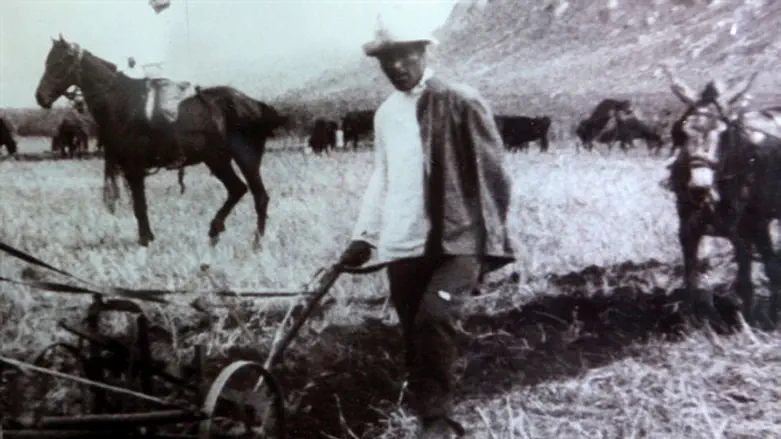
The 100th yahrziet of Yosef Trumpeldor is the Shabbat eve before Purim this year. A century after his combat death, Trumpeldor stands out as one of the most important individuals who played a part in the founding and building of the State Of Israel. A courageous soldier, a brilliant and indefatigable organizer, and a highly principled and selfless pioneer, Trumpeldor was universally mourned by Zionists of all ideological persuasions.
Born in Russia in 1880, Trumpeldor lost an arm during the Russo-Japanese War at the 1904/1905 Siege of Port Arthur. Taken off of the front-lines because of his injury, he pleaded with his commander: “Even though I have only one arm, it is my right arm, and my request is that I be given a sword and rifle to continue to fight.”
Later he was a prisoner of war and organized Zionist activities for hundreds of Jewish fellow captives.
Trumpeldor rose to become an officer in the Czarist army, an extremely rare accomplishment for a Jew. After returning from the war, the intensification of Russian anti-Semitism convinced him that as a Jew, he had no future in Russia. His thoughts turned again to practical Zionism and he decided to leave Russia for the Land of Israel.
At this time, he developed the theoretical groundwork for the pioneering Zionist organization that eventually became known as HeChalutz. This was a group of young Jews who focused on preparing a generation of diaspora youth for a life of farming and manual labor in the Land of Israel. Trumpeldor envisaged the HeChalutz as “an army of anonymous servants of Zion,” which would renounce lives of ease and luxury for the “supreme challenge of building up” the Jewish community in the Land of Israel.
Trumpeldor arrived in the Land of Israel in 1911 and worked as a laborer in the Galilee. There, he became acquainted with the problems Zionist pioneers were facing. He saw that many Jewish landowners were hiring Arab workers instead of Jewish laborers because they were cheaper; he chose to take up the issue and called for Jewish employment. He also became involved with the HaShomer Jewish defense group.
Attending the 11th World Zionist Congress in 1913, Trumpeldor participated in the discussions about the problems of enlarging the scale of Jewish settlement activities in the Galilee. Immediately thereafter he returned to Russia with the hope of organizing a mass immigration of Jews to the Land of Israel. He returned to Israel on the eve of World War One to find that the Ottoman Turkish government was at war with Russia and was deporting to Egypt Jewish residents of Russian background who refused to accept Turkish citizenship.
In Egypt, Trumpeldor joined with Zionist leader Ze’ev Jabotinsky. They contacted the British army to propose that Jewish emigres be organized to fight with British. The result was the Zion Mule Corps commanded by Trumpeldor of which over 550 saw action in the Gallipoli campaign where they were given orders in Hebrew and had a Star of David insignia. These men were the first Hebrew soldiers comprising a Jewish military force in modern times. Trumpeldor was promoted to captain and strongly emphasized discipline and devotion among his soldiers. The reputation for courage and heroism that the Zion Mule Corps quickly earned was a testament to Trumpeldor’s success.
After leaving the Zion Mule Corps Trumpeldor, was inspired by its success and visited Russia with the plan to create a 100,000 man force to take the Land of Israel from the Ottomans. Trumpeldor devoted himself to organizing groups of Chalutzim throughout Russia and after the fall of the Kerensky government to the Bolsheviks, he departed Russia for the last time and returned to the Land of Israel for a third time in 1919. Throughout all of this timeframe, he continued to seek a way to organize a Zionist force to take over Israel.
Back in Israel he quickly perceived the precarious situation of the Zionist settlements in the Galilee. He organized the defenses at the farming community at Tel Chai. He fell in the legendary battle there on February 29, 1920, Adar 11. His last words, “Tov lamut be’ad Artzenu (It’s good to die for our land)” - although there are different versions of the exact wording - and his bravery turned him into a symbol of Zionist pioneer fighting spirit.
Trumpeldor had already been a Zionist legend during his lifetime and after his death those who knew him sought ways to mark his death and continue his work. A group of Russian HeChalutz named a labor battalion after him.
Jabotinsky wrote a poem in his fallen comrade’s honor and named a Zionist youth movement and its sports club Brit Yosef Trumpeldor (Betar) in his memory.
The city of Kiryat Shemona was dedicated to him and the other seven defenders who all gave their lives in 1920 to safeguard Zionist communities in the Upper Galilee.
At the battle site a massive stone statue of a lion of Judah was created to mark his grave and became a national shrine that all Zionist youth movements still visit annually.
And that is a very good thing.
Moshe Phillips is national director of Herut North America’s U.S. division and a candidate on the Herut slate in the 2020 World Zionist Congress's US elections; Herut is an international movement for Zionist pride and education and is dedicated to the ideals of pre-World War Two Zionist leader Ze'ev Jabotinsky. Herut's website is https://www.voteherut2020.com/ ]